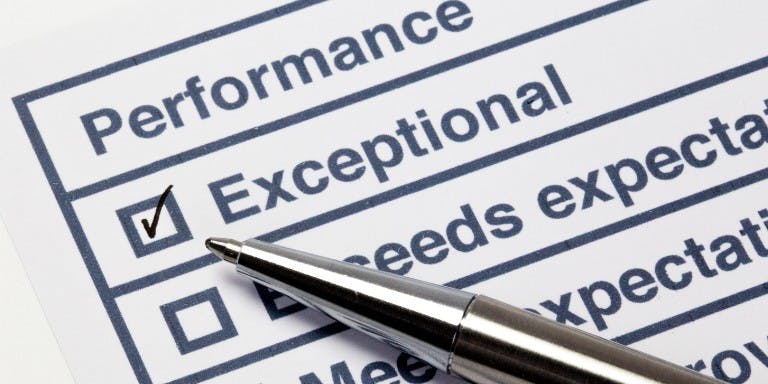First published on Tuesday, May 4, 2021
Last updated on Friday, November 29, 2024
Jump to section
Performance appraisals or employee performance reviews are an important part of the performance management process.
Giving managers and employees an opportunity to assess individual performance, to discuss current goals, objectives for the future and development opportunities.
In this article we provide a simple guide for managers seeking more information about employee appraisals and how these can be used within a business.
What is an appraisal?
A performance appraisal (or review) is an important time to discuss your employees’ performance and development. It’s a meeting between an individual and their line manager to record recent achievements and decide on future objectives. Helping to maximise the potential of their role.
Traditionally, an appraisal is completed every 12 months, however some businesses choose to favour bi-annual or even quarterly appraisals. With the aim of gaining a better understanding of individual employees, their performance, and to support employee wellbeing.
While there’s no legal requirement to hold performance reviews for your staff, there are many benefits to appraisal meetings whether it be annually or throughout the year.
The purpose of an appraisal
Appraisals fall under the umbrella of performance management in the workplace. Providing employers with a formal structure for reviewing employee performance, away from the eyes and ears of other team members.
The goal is to gain insight into your employee's job performance and determine ways to help them develop their skills and advance in their role. Appraisals should also cover everything from good performance and poor performance to past performance and future performance.
How often should you hold staff appraisals?
As mentioned above, most companies choose to hold annual employee appraisals—this would be the recommendation. However, as there is no legal requirement, you can choose to hold your appraisals more or less frequently.
Annually allows for a complete review of an employee's performance year to date. Just keep in mind, it may not be possible to cover everything from the past 12 months in one meeting. Which is why more businesses have opted for bi-annual appraisal meetings.
Reasons to conduct an employee appraisal
Reviewing an employee’s performance within their role provides several benefits for you, your business and your employee. Obviously, the main one being an improvement in performance, but other benefits include:
Provides career growth opportunities
As an employee develops within their role, these appraisal meetings allow them the chance to discuss their goals and ambitions for the future. Providing opportunity for career growth and professional development.
Improved relationships between managers and staff
Thoughtful reviews demonstrate you care about an employee's growth and success. This builds trust and a sense of partnership working toward shared priorities.
Promotes positive company culture
Employee appraisals can help to strengthen the culture of your company. Highlighting the importance of employee morale, engagement and retention, means employees will feel a sense of belonging and responsibility within their roles.
Greater communication
Strong communication forms the foundation of all good working relationships. Having frequent performance reviews helps to promote open and honest communication between managers and team members. Encouraging employees to speak up about their goals, concerns and ideas for the future.
Increases employee engagement
If an employee is aware of the recognition and reward, they may receive when working hard, they are more likely to be engaged at work. Engagement in the workplace is also one of the key factors that influences rates of employee retention. Making it an important area of focus for business owners and managers.
Employee recognition opportunities
Appraisals will allow you to identify your high performers, giving you the chance to recognise and praise good work across the business. This also helps to determine who deserves greater challenges and responsibilities. Promoting from within also boosts morale.
Identifies areas for improvement or problems within the team
Frequent feedback, both positive and constructive, helps your employees develop their skills and boost performance. Performance reviews will allow you to quickly identify when an employee may be struggling to meet their goals, and who within the team may require additional support.
Performance improvement plans are a solution for when underperformance may be an issue.
Performance appraisals are a must for any employer who wants a team operating at peak potential. Done with care and careful consideration, the evaluation process can motivate, develop talent, build trust, and uncover your brightest stars—all of which translate to a highly productive, engaged workforce and a thriving business.
Tips to improve your performance appraisals
Be prepared
As with any other task, preparation is key. It helps you to efficiently plan your appraisal meetings. Creating an agenda of focus points and areas for discussion. This will ensure that you stick to the proposed plan and do not exceed your allotted meeting time.
Document the process
Keeping clear written documentation of your conversations and any objectives set within your appraisal meetings makes it easy for both you and your employee to understand the plan moving forward. Plus, this gives you something to look back on when you come to complete your next performance review.
Give honest feedback
It’s important to use this formal meeting to communicate openly with your employee. Providing valuable feedback that they can apply within their role moving forward.
Discuss and offer ideas for improvement
It’s important to not shy away from discussing skills gaps or areas for an improvement. In fact, any employee will benefit from knowing where they may be able to develop skills and what type of training could be provided to support their professional development.
Agree upon actionable steps
At the end of an appraisal meeting both manager and employee should be aware of the next steps. Some good examples include:
Undertaking a training course
Collaborating with the wider team on a new project
Focusing on deadlines and quality of work over quantity
Follow up frequently
To ensure your employees are on track and making good progress be sure to hold regular follow up meetings. These can be as simple as a weekly one-to-one meeting. It may be that during these meetings you discover an employee requires some extra support. Such as some additional training or even an extension of the team with a new hire.
How a performance management software can support your appraisal process
Another way to improve your performance appraisal process is to implement the use of a performance management software. Tools such as these allow for the digitalisation of several internal performance management processes. Helping you to store and track employee details, goals, progress, development, and annual performance metrics.
With BrightHR’s performance management software you can:
Set SMART goals and track progress
Align employee goals with business objectives
Gain full visibility of goal progress
Add reminders for employees to complete goal-based tasks
Keep notes of performance meetings
Access ready-made templates for your appraisal meetings with BrightBase
Enhance your employee appraisals with BrightHR
With BrightHR’s performance management software, it’s easier than ever to schedule appraisal meetings, set agendas, and document meeting notes.
Your appraisal process can be streamlined and enhanced with data-backed performance feedback and a 360-degree view of your employee’s performance progress. Putting the purpose back into annual and bi-annual performance appraisals.
Book a free demo with BrightHR today to discover how our award-winning HR software solution can transform your performance management processes.
Have a question?
Ask away, we’ve got lightning fast answers for UK business owners and employers powered by qualified experts.










